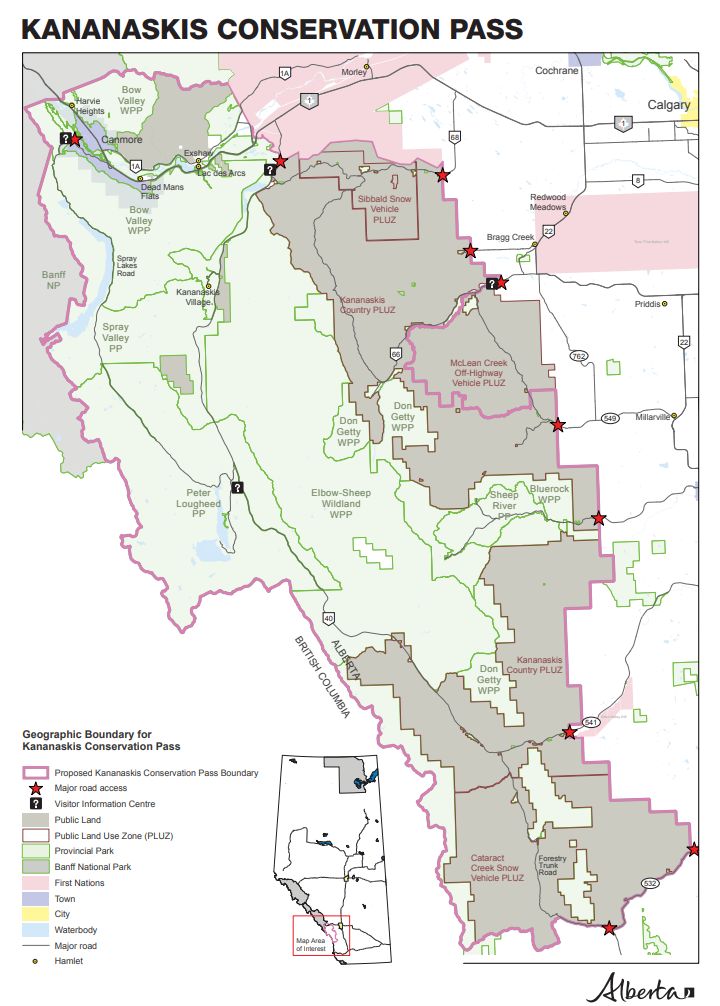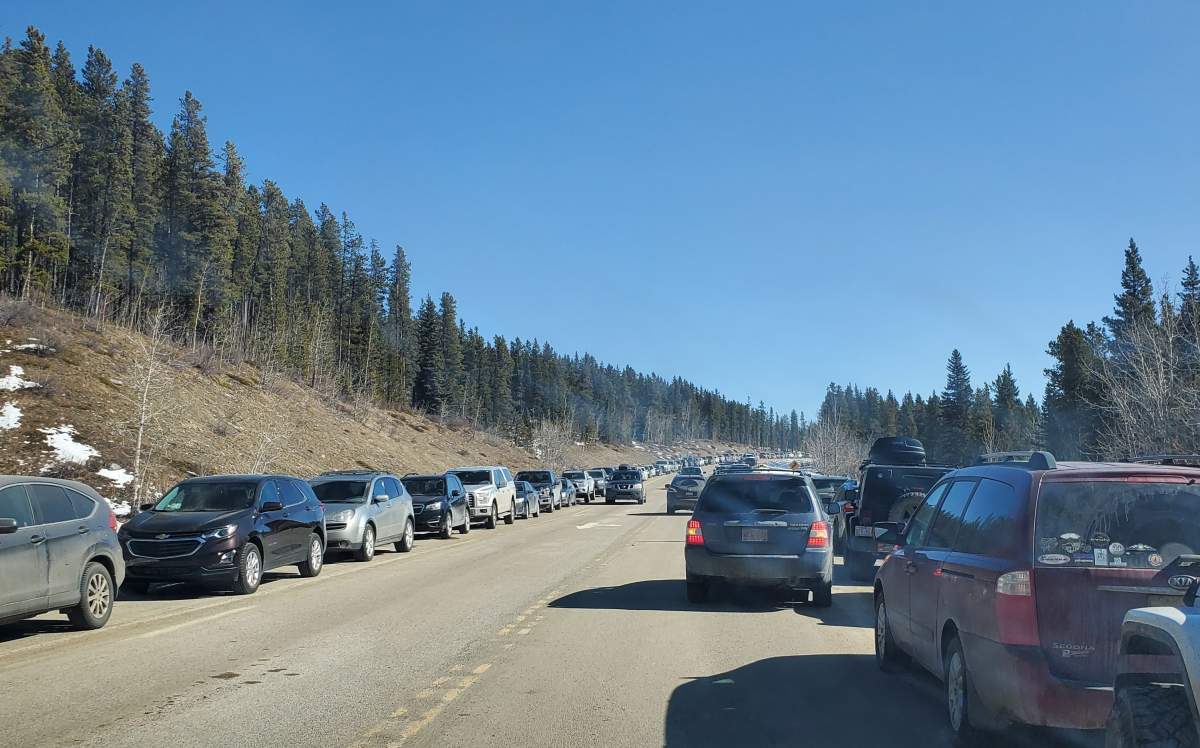Albertans hoping to escape to a popular provincial recreation area in the Rockies during the COVID-19 pandemic will soon have to pay for the privilege.

Kananaskis Country, which is about 100 kilometres west of Calgary, has been flooded with visitors — particularly in the past year due to restrictions designed to limit the spread of the virus.
Alberta Environment Minister Jason Nixon said in 2020 the scenic area attracted 5.4 million visitors, which is one million higher than nearby Banff National Park.
Since 2014, he added, visits to the area have increased by 70 per cent resulting in overflowing garbage cans, illegal parking, injuries, overcrowded trails and day-use areas, and conflicts between people and animals.

He said search and rescue also responded to 428 calls for help last year — a 51 per cent increase over 2019.
“It’s more incidents than in the national parks of Banff, Yoho, Kootenay, Jasper and Waterton combined,” Nixon said at a news conference in Kananaskis on Tuesday.
“Quite simply these pressures are not sustainable.”

Nixon said as of June 1, visitors can either pay $15 for a day visit or $90 in a per-vehicle annual fee. He said Albertans have indicated they don’t mind paying a fee if the money goes to support the area.
“The cost is modest and is, in fact, less than the access fee which is charged in the national mountain parks in our province like Banff and Jasper.”
The Kananaskis Conservation Pass area includes provincial parks, public land in Kananaskis, provincial campgrounds and day-use areas in the Bow Valley corridor. Areas around Canmore are also included.
In an email to Global News, a spokesperson for the ministry of Environment and Parks explained why certain areas would be covered by the new fee and others exempt.

Get weekly money news
“The Kananaskis Conservation Pass does not cover the McLean Creek Area because we did not want to stack fees for random camping,” Paul Hamnett said.
Anyone camping within the McLean Creek Area needs to buy a Public Lands Camping Pass for random camping along the Eastern Slopes of the Rocky Mountains starting June 1. A per-person pass is $30/season and passes are available online using the AlbertaRELM system or app.
“As promised in our election platform, an off-highway vehicle fee is still under development and we expect to introduce that fee in the fall.”

A fee will not be charged to visit the Town of Canmore.
“You don’t need the Kananaskis Conservation Pass to go to Canmore,” Hamnett said. “If you park at the provincial recreation sites such as Grassi Lakes or the Canmore Nordic Centre nearby, then the pass will apply.”
Canmore’s mayor is “cautiously supportive” of the conservation pass.
” I recognize that the status quo of rapidly increasing congestion in the sensitive natural areas is untenable, and that management initiatives such as these can be an effective tool to mitigate negative impact on the local environment,” John Borrowman said.
“The commitment to increase provincial resources to manage the use of the landscape is a welcome piece of news, as there has long been a dire need for these resources in the Bow Valley.
“The Town of Canmore has been advocating for these additional resources for many years.”
However, Borrowman said he’s cautious about the possible negative impact on some of the municipal facilities and infrastructure.
“Our recently approved plan for paid parking at Quarry Lake this summer, with resident permit parking only in adjacent neighbourhoods, will now be even more critical in protecting our municipality against the spill-over from adjacent provincial areas.”
The fee is expected to raise about $15 million per year. It will pay for trail maintenance, search and rescue operations, visitor services and the upkeep of facilities at day-use areas and campgrounds, he said.
It will also go toward increasing on-the-ground education and enforcement with additional conservation officers and allow for the reopening of visitor centres that were temporarily closed last year.
Day passes will be registered to a single vehicle, while annual can be for up to two vehicles. Only one pass will be required per vehicle, regardless of the number of passengers, according to the province.
“One of the spinoffs we’re hoping will eventually be some reduced traffic count, because on the trajectory that we’re at it’s not sustainable,” Nixon said.
First Nations members, those who need to stop in the area for business purposes and recipients of Alberta’s Assured Income for the Severely Handicapped (AISH) program will be exempted from the fee.
The Opposition NDP condemned the announcement, saying the United Conservative government continues to take money out of the pockets of Albertans.
“Working families are already being pushed to the brink by the pandemic and the long list of new costs (Premier) Jason Kenney has imposed on them,” said Joe Ceci, the legislature member for Calgary Buffalo.
“It’s an insult to the legacy of (former premier) Peter Lougheed. The UCP should have learned their lesson from trying to sell off provincial parks and mine our mountains.”

The Alberta Wilderness Association called the decision further evidence of the government’s commitment to the “user fee model” for funding parks.
“This fee is a cash grab that will deter Albertans from visiting Kananaskis and shift the visitation pressure to provincial parks outside of K-Country that don’t charge a vehicle-entry fee,” said conservation director Ian Urquhart.
The Canadian Parks and Wilderness Society said it recognizes the need for sustained funding for recreation, conservation, and related infrastructure to support healthy communities and healthy economies but says the province shouldn’t rely on a user-pay model.
The society said if the fees are implemented, they should correspond with an increase in environmental protection.
The pass will be available online and at Kananaskis visitor information centres during operating hours. The province said the new Kananaskis Conservation Pass will also eliminate the cross-country trail grooming parking pass program.
The introduction of the Kananaskis pass comes two weeks after the Alberta government also introduced Bill 64, the Public Lands Amendment Act, to charge fees for recreation activities on public (Crown) land.
The Alberta government is intending to begin charging a camping fee on Crown land along the eastern slopes, or foothills, starting on June 1.
— With files from Emily Mertz and Karen Bartko, Global News









Comments